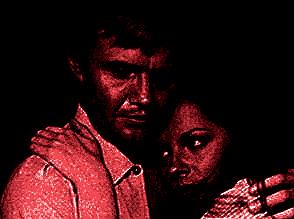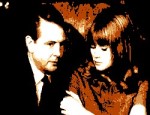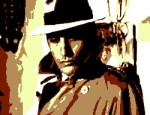Film Review
Coming hot on the heels of Fred Zinnemann's
The Day of the Jackal (1973),
The Odessa File was the second film
adaptation of a best-selling novel by the prolific British writer
Frederick Forsyth. Whilst it may lack the intensity and seductive
stylisation of Zinnemann's film, this second helping of dark Forsythian
intrigue still makes a compelling thriller. The generally
lacklustre script is more than adequately compensated for by a strong
central performance from Jon Voight and some creditable supporting
contributions from such talented actors as Maximilian Schell, Derek
Jacobi and Mary Tamm. Schell is particularly impressive as the
spine-chillingly evil Nazi villain.
The Odessa File was directed
with aplomb by Ronald Neame, the one-time cinematographer of David Lean
whose previous film,
The Poseidon Adventure (1972),
was one of the biggest box office hits of the decade. In contrast
to the operatic scale of that epic disaster movie, this low-key
thriller is a comparatively modest affair, although its drab locations
and understated mise-en-scène give it a chilling realism that is
instantly evocative of its time. The pace is slow but the story
is focussed and meticulously plotted, building to a stunning climax which, if
anything, is more powerful and moving than that of Forsyth's
novel.
The Odessa File is
an underrated classic of British cinema.
© James Travers 2010
The above content is owned by frenchfilms.org and must not be copied.
Film Synopsis
Munich, November 1963. Whilst the world is still reeling from the
news of President Kennedy's assassination, journalist Peter Miller
allows himself to be distracted by the suicide of an elderly Jewish
man, Solomon Tauber. Miller gets hold of Tauber's diary in which
the dead man recounts his experiences in a Nazi concentration camp
in Riga during the war. Tauber singles out one particular
SS officer for condemnation, Eduard Roschmann, a man who ruthlessly
butchered thousands of Jews. Moved by what he reads, Miller is
impelled to seek out one of Tauber's few friends, from whom he learns that
Roschmann is still alive and working in Germany under a new
identity. When the police refuse to help him unmask Roschmann,
Miller falls in with a group of Israeli intelligence operatives.
With their help, the journalist plans to infiltrate the Odessa, the
organisation that exists to prevent Nazi criminals from being brought
to justice. Miller's enquiries are soon noticed by
high-ranking Odessa agents, who decide that he must be eliminated without delay...
© James Travers
The above content is owned by frenchfilms.org and must not be copied.



